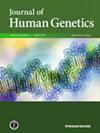Investigating common mutations in ATP7B gene and the prevalence of Wilson’s disease in the Thai population using population-based genome-wide datasets
IF 2.6
3区 生物学
Q2 GENETICS & HEREDITY
引用次数: 0
Abstract
Wilson’s disease (WD) is a rare metabolic disorder caused by variations in the ATP7B gene. It usually manifests hepatic, neurologic, and psychiatric symptoms due to excessive copper accumulation. The prevalence of WD and its common variants differ across populations. This study aimed to examine these aspects of WD within the Thai population, where information has been limited. We reviewed ClinVar and the Wilson Disease Mutation Database, organizing variants classified as pathogenic or likely pathogenic in one or both databases as “relaxed” and “strict” lists. Allele frequencies were estimated from genotyping array data (Asian Screening Array: ASA; Illumina Corp, CA) of 6291 Thai subjects, which also underwent genotype imputation. The prevalence of WD in the Thai population was estimated assuming Hardy-Weinberg Equilibrium. The strict list yielded a prevalence of 1/24,128 (carrier frequency=1/78), while the relaxed list yielded a prevalence of 1/9971 (carrier frequency=1/50). The most common WD variants in Thai subjects were c.2333 G > T, c.3443 T > C, and c.813 C > A from the strict list, and c.3316 G > A and c.2605 G > A from the relaxed list. The ASA chip covered approximately 59 and 24% of WD variants from the strict and relaxed lists, respectively. Based on the estimated prevalence, a carrier screening program for WD is not currently required in Thailand. However, as genotyping services become more affordable and accessible, such a program would facilitate early identification, treatment, and prevention of WD.利用基于人群的全基因组数据集调查泰国人群中 ATP7B 基因的常见突变和威尔逊氏病的患病率。
威尔逊氏病(WD)是一种罕见的代谢性疾病,由 ATP7B 基因变异引起。由于铜积累过多,它通常表现为肝脏、神经和精神症状。WD的发病率及其常见变异在不同人群中存在差异。本研究的目的是在信息有限的泰国人群中研究 WD 的这些方面。我们查阅了 ClinVar 和威尔森氏病突变数据库,将在一个或两个数据库中被归类为致病或可能致病的变异体整理为 "宽松 "和 "严格 "列表。根据 6291 名泰国受试者的基因分型阵列数据(Asian Screening Array: ASA; Illumina Corp, CA)估算了等位基因频率,并对这些数据进行了基因型归因。假定Hardy-Weinberg Equilibrium平衡,对泰国人群的WD患病率进行了估计。严格列表的患病率为1/24,128(携带者频率=1/78),而宽松列表的患病率为1/9971(携带者频率=1/50)。泰国受试者中最常见的 WD 变异是严格列表中的 c.2333 G > T、c.3443 T > C 和 c.813 C > A,以及宽松列表中的 c.3316 G > A 和 c.2605 G > A。ASA 芯片分别覆盖了严格列表和宽松列表中约 59% 和 24% 的 WD 变异。根据估计的发病率,泰国目前不需要开展 WD 携带者筛查项目。不过,随着基因分型服务变得更加经济实惠和容易获得,这样的项目将有助于WD的早期识别、治疗和预防。
本文章由计算机程序翻译,如有差异,请以英文原文为准。
求助全文
约1分钟内获得全文
求助全文
来源期刊

Journal of Human Genetics
生物-遗传学
CiteScore
7.20
自引率
0.00%
发文量
101
审稿时长
4-8 weeks
期刊介绍:
The Journal of Human Genetics is an international journal publishing articles on human genetics, including medical genetics and human genome analysis. It covers all aspects of human genetics, including molecular genetics, clinical genetics, behavioral genetics, immunogenetics, pharmacogenomics, population genetics, functional genomics, epigenetics, genetic counseling and gene therapy.
Articles on the following areas are especially welcome: genetic factors of monogenic and complex disorders, genome-wide association studies, genetic epidemiology, cancer genetics, personal genomics, genotype-phenotype relationships and genome diversity.
 求助内容:
求助内容: 应助结果提醒方式:
应助结果提醒方式:


